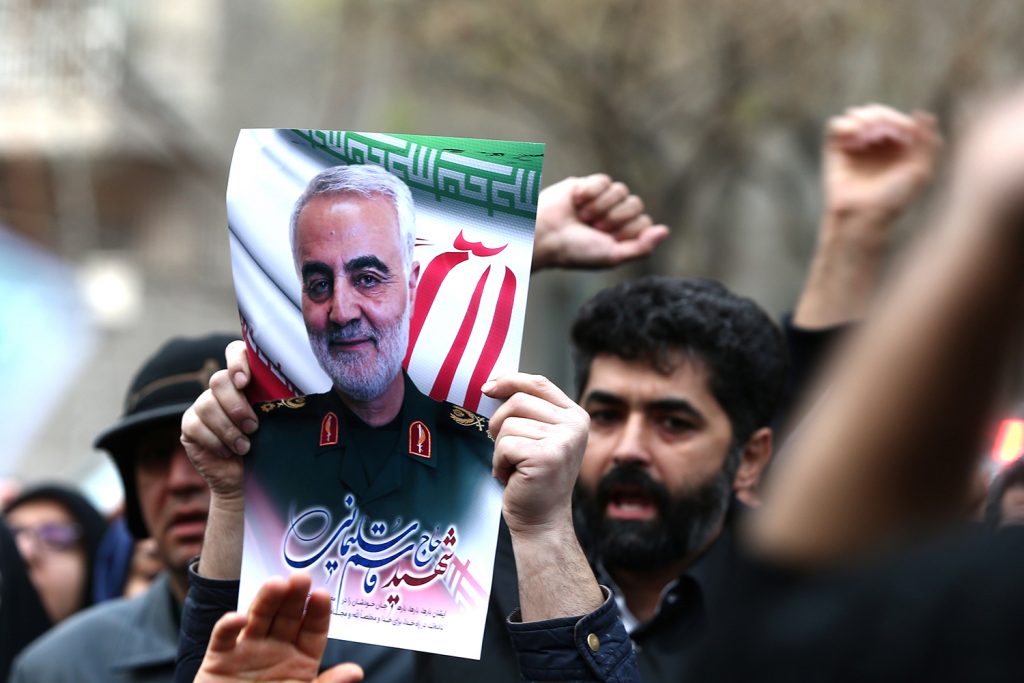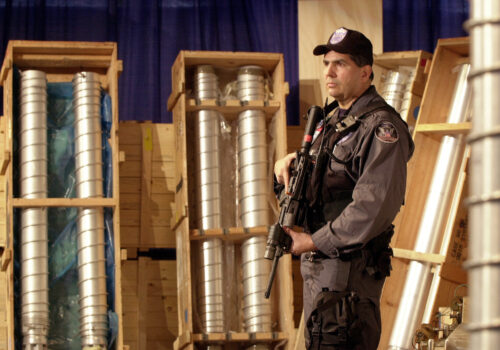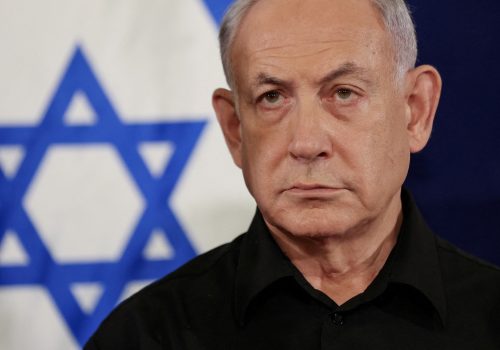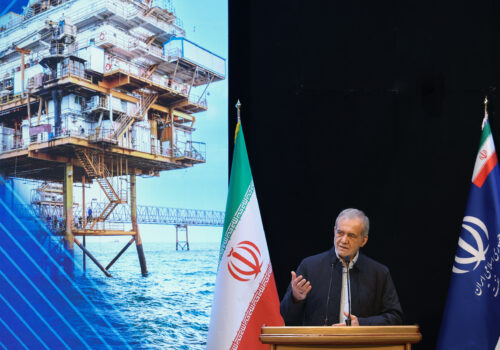Beyond the bomb: Ideology as the engine of Iran’s nuclear doctrine
As a new round of nuclear talks between the United States and the Islamic Republic looms, negotiators must come to terms with the fact that the threat of the Iranian regime is not rooted in its nuclear ambitions, but rather in Tehran’s ideological foundation.
Should the officials return to negotiations, Washington must acknowledge the ideological motivations underpinning Iran’s nuclear ambitions beyond enrichment levels, centrifuge counts, and sunset clauses.
What US President Donald Trump’s administration might overlook is that Iran’s nuclear program is not simply about energy or military deterrence—it is a tool for advancing a revolutionary ideology. Since 1979, the Islamic Republic has operated along two strategic tracks: exporting its Shia revolutionary doctrine and establishing influence through networks like the “Axis of Resistance.” This expansion is not limited to the Middle East—it includes initiatives in Africa and Latin America, where Iran quietly builds ideological and military infrastructure.
At the core of this ideology is an enduring hostility toward the United States and an obsession with the destruction of Israel. This hostility has been cultivated, promoted, and practiced by both Supreme Leaders, beginning with Rouhollah Khomeini’s Friday prayer pulpit in Jamaran to Ali Khamenei’s headquarters in Pasteur and millions of social media followers. After forty-six years of its existence, we have also seen that all presidents within the regime—reformists as well as hardliners alike—have adhered to these tenets of the revolution.
The regime sees both countries not just as geopolitical threats, but as ideological antitheses. The United States, “the Great Satan,” symbolizes liberal democracy, capitalism, religious pluralism, and gender equality. Israel, “the Little Satan,” presents a unique and intolerable affront: a sovereign Jewish state thriving in the heart of what hardliners see as Islamic land.
For Iran’s leadership, Israel is not merely a rival; it is the primary obstacle to their ideological vision of regional domination. As Khomeini declared and Khamenei later invoked, the position on Israel is tantamount to a cancerous tumor that must be eradicated. The Jewish state’s very existence undermines their belief in a historical and religious destiny that dates back to the Islamic conquests of the seventh century.
Western negotiators cannot dismiss the regime’s rhetoric. For decades, paired chants of “Death to America” and “Death to Israel” have echoed across Iranian political, educational, and religious institutions. Famously, the regime erected a public billboard with a clock counting down to the destruction of Israel. Even during what was supposed to be friendlier times, post-Joint Comprehensive Plan of Action (JCPOA) on the heels of the nuclear agreement, Khamenei declared that Israel would not exist in 25 years and triggered an eruption of “death to America chants” among hundreds of his disciples.
SIGN UP FOR THIS WEEK IN THE MIDEAST NEWSLETTER
The leadership of the Islamic Republic may change its behavior toward the West, but as they keep reminding the world, their intentions remain constant. Khamenei relented and in a shift of policy which can be explained as “taqiyyah” (religious dissimulation), permitted negotiations with the Trump administration.
But his enduring defiance of Washington was apparent, declaring that “the difference between the Iranian nation and others is that it has the courage to say the truth that America is an aggressor, a liar, a deceiver … therefore, it says “death to America,” but others do not have the courage to state these facts.”
It’s imperative that the United States does not regard Supreme Leader Khamenei’s fatwa against nuclear weapons as an insurance policy. While fatwas are powerful religious principles for adherents of Islam, they are reversible, and Tehran has a track record in the use of deception and religious justifications for such strategic reversals.
History has demonstrated the malleability of fatwas and how they can undermine any agreement based on their supposed permanence. Just recently, Khamenei reversed his long-standing opposition to negotiations with the United States—an unfathomable decision for a leader who has been outspokenly enraged by the first Trump administration’s alleged involvement in the assassination of General Qassem Soleimani.

The concepts of taqiyyah and “khod’eh” (strategic deceit) are deeply embedded in the regime’s political playbook and play a role in this malleability. These tools allow the regime to maintain flexibility in negotiations and justify sudden policy shifts with religious cover.
Khomeini favored “khod’eh” back in 1978, when, from exile, he made glorious promises to the citizens: “The future government of Iran will be a democratic government in which religion has no role in government.” Later, he confessed that this and other promises were all “khod’eh.”
Khamenei, on the other hand, favors taqiyyah. In a 2001 Friday prayer, Khamenei clearly stated that “taqiyyah is one of our religious principles; where a Muslim’s life or the interests of Islam are at risk, taqiyyah must be practiced.” By allowing nuclear negotiations, Khamenei has certainly put this policy into practice and shifted Tehran’s political positions regarding the West.
Western analysts must also examine the inconsistencies in Iran’s domestic energy strategy, raising questions about the declared civilian purpose of their nuclear development. Despite being a top global exporter of oil and gas, Iran regularly experiences power shortages. If nuclear energy were truly intended for peaceful, civilian use, we would expect to see investments that alleviate domestic needs. Instead, the regime channels resources into expanding nuclear infrastructure with ambiguous or secretive intent.
Ultimately, the defining question missing from nuclear negotiations across both Democratic and Republican administrations is not about centrifuge counts, enrichment levels, or the range of missiles. Nor is it about whether Iran will have the means to carry out a nuclear attack against Israel.
The central question for US negotiators is intent: Is the Islamic Republic willing to renounce its dangerous objective of eliminating Israel? Can it ever recognize Israel’s right to exist as a sovereign, Jewish state?
So far, every signal—from public rhetoric to foreign policy strategy—suggests the answer is no. Until Western leaders are willing to confront this reality, any agreement based on technical constraints, rather than ideological transformation, will be both fragile and dangerously naïve.
Marjan Keypour Greenblatt is an advisory board member of the Atlantic Council’s Iran Strategy Project and New Union for Democracy in Iran (NUFDI) and the founder and director of the Alliance for Rights of All Minorities (ARAM).
Further reading
Wed, Apr 30, 2025
From Tripoli to Tehran: Lessons from Libya in US-Iran nuclear talks
MENASource By
Twenty-one years later, the nuclear disarmament of Libya serves as a model for the United States in current nuclear negotiations with Iran.
Mon, Apr 28, 2025
Why Israel will resist any US-Iran nuclear deal
MENASource By Danny Citrinowicz
Negotiations between the United States and Iran have displayed a significant divide between Washington and it’s ally Israel.
Wed, Apr 23, 2025
Gas diplomacy: A blueprint for Middle East peace and global energy security
MENASource By
A US-Iran deal could serve as a turning point towards a wider strategy encompassing regional de-escalation and energy diplomacy.
Image: Iran's Supreme Leader, Ayatollah Ali Khamenei visits the IRGC Aerospace Force achievements exhibition in Tehran, Iran November 19, 2023. Office of the Iranian Supreme Leader/WANA (West Asia News Agency) via REUTERS.


